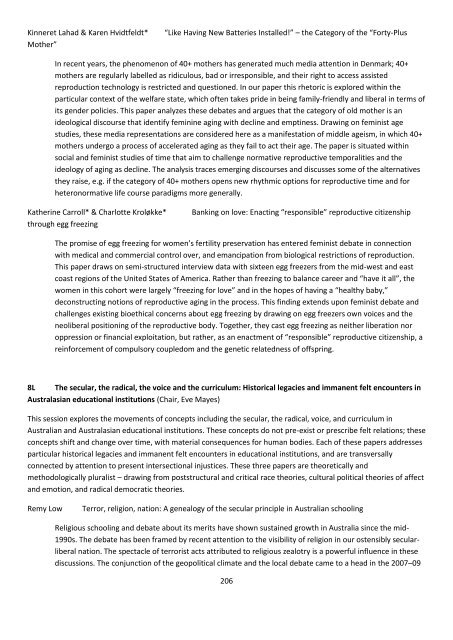Crossroads in Cultural Studies Conference 14-17th December 2016 Program Index
Crossroads-2016-final-draft-program-30-Nov
Crossroads-2016-final-draft-program-30-Nov
Create successful ePaper yourself
Turn your PDF publications into a flip-book with our unique Google optimized e-Paper software.
K<strong>in</strong>neret Lahad & Karen Hvidtfeldt*<br />
Mother”<br />
“Like Hav<strong>in</strong>g New Batteries Installed!” – the Category of the “Forty-Plus<br />
In recent years, the phenomenon of 40+ mothers has generated much media attention <strong>in</strong> Denmark; 40+<br />
mothers are regularly labelled as ridiculous, bad or irresponsible, and their right to access assisted<br />
reproduction technology is restricted and questioned. In our paper this rhetoric is explored with<strong>in</strong> the<br />
particular context of the welfare state, which often takes pride <strong>in</strong> be<strong>in</strong>g family-friendly and liberal <strong>in</strong> terms of<br />
its gender policies. This paper analyzes these debates and argues that the category of old mother is an<br />
ideological discourse that identify fem<strong>in</strong><strong>in</strong>e ag<strong>in</strong>g with decl<strong>in</strong>e and empt<strong>in</strong>ess. Draw<strong>in</strong>g on fem<strong>in</strong>ist age<br />
studies, these media representations are considered here as a manifestation of middle ageism, <strong>in</strong> which 40+<br />
mothers undergo a process of accelerated ag<strong>in</strong>g as they fail to act their age. The paper is situated with<strong>in</strong><br />
social and fem<strong>in</strong>ist studies of time that aim to challenge normative reproductive temporalities and the<br />
ideology of ag<strong>in</strong>g as decl<strong>in</strong>e. The analysis traces emerg<strong>in</strong>g discourses and discusses some of the alternatives<br />
they raise, e.g. if the category of 40+ mothers opens new rhythmic options for reproductive time and for<br />
heteronormative life course paradigms more generally.<br />
Kather<strong>in</strong>e Carroll* & Charlotte Kroløkke*<br />
through egg freez<strong>in</strong>g<br />
Bank<strong>in</strong>g on love: Enact<strong>in</strong>g “responsible” reproductive citizenship<br />
The promise of egg freez<strong>in</strong>g for women’s fertility preservation has entered fem<strong>in</strong>ist debate <strong>in</strong> connection<br />
with medical and commercial control over, and emancipation from biological restrictions of reproduction.<br />
This paper draws on semi-structured <strong>in</strong>terview data with sixteen egg freezers from the mid-west and east<br />
coast regions of the United States of America. Rather than freez<strong>in</strong>g to balance career and “have it all”, the<br />
women <strong>in</strong> this cohort were largely “freez<strong>in</strong>g for love” and <strong>in</strong> the hopes of hav<strong>in</strong>g a “healthy baby,”<br />
deconstruct<strong>in</strong>g notions of reproductive ag<strong>in</strong>g <strong>in</strong> the process. This f<strong>in</strong>d<strong>in</strong>g extends upon fem<strong>in</strong>ist debate and<br />
challenges exist<strong>in</strong>g bioethical concerns about egg freez<strong>in</strong>g by draw<strong>in</strong>g on egg freezers own voices and the<br />
neoliberal position<strong>in</strong>g of the reproductive body. Together, they cast egg freez<strong>in</strong>g as neither liberation nor<br />
oppression or f<strong>in</strong>ancial exploitation, but rather, as an enactment of “responsible” reproductive citizenship, a<br />
re<strong>in</strong>forcement of compulsory coupledom and the genetic relatedness of offspr<strong>in</strong>g.<br />
8L The secular, the radical, the voice and the curriculum: Historical legacies and immanent felt encounters <strong>in</strong><br />
Australasian educational <strong>in</strong>stitutions (Chair, Eve Mayes)<br />
This session explores the movements of concepts <strong>in</strong>clud<strong>in</strong>g the secular, the radical, voice, and curriculum <strong>in</strong><br />
Australian and Australasian educational <strong>in</strong>stitutions. These concepts do not pre-exist or prescribe felt relations; these<br />
concepts shift and change over time, with material consequences for human bodies. Each of these papers addresses<br />
particular historical legacies and immanent felt encounters <strong>in</strong> educational <strong>in</strong>stitutions, and are transversally<br />
connected by attention to present <strong>in</strong>tersectional <strong>in</strong>justices. These three papers are theoretically and<br />
methodologically pluralist – draw<strong>in</strong>g from poststructural and critical race theories, cultural political theories of affect<br />
and emotion, and radical democratic theories.<br />
Remy Low<br />
Terror, religion, nation: A genealogy of the secular pr<strong>in</strong>ciple <strong>in</strong> Australian school<strong>in</strong>g<br />
Religious school<strong>in</strong>g and debate about its merits have shown susta<strong>in</strong>ed growth <strong>in</strong> Australia s<strong>in</strong>ce the mid-<br />
1990s. The debate has been framed by recent attention to the visibility of religion <strong>in</strong> our ostensibly secularliberal<br />
nation. The spectacle of terrorist acts attributed to religious zealotry is a powerful <strong>in</strong>fluence <strong>in</strong> these<br />
discussions. The conjunction of the geopolitical climate and the local debate came to a head <strong>in</strong> the 2007–09<br />
206


